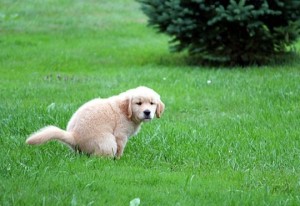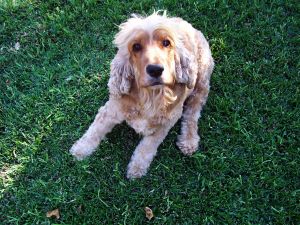 The last thing we think about when we get a new dog is about dog poop. We think about the shots, the leash, the water dish, the food, the bed, and so much more. But we never think about the poop, and specifically, how we’ll dispose of it. But even though our dog’s poop is the last thing on the mind, unless we have a plan for what to do with it, it’s the first thing we notice. Here are four ways to dispose of your dog’s poop that’ll help you avoid one smelly problem.
The last thing we think about when we get a new dog is about dog poop. We think about the shots, the leash, the water dish, the food, the bed, and so much more. But we never think about the poop, and specifically, how we’ll dispose of it. But even though our dog’s poop is the last thing on the mind, unless we have a plan for what to do with it, it’s the first thing we notice. Here are four ways to dispose of your dog’s poop that’ll help you avoid one smelly problem.
1. Scoop the Poop
The pooper-scooper is a staple item in many dog owners’ arsenal, and you’ll often see dog walkers use them. Why? Because nothing’s easier in life than not having to bend down to pick up a pile of poop. It also prevents you from having to wrap your hands around your dog’s excrement, which many people are extremely thankful for.
The benefits of the pooper-scooper are that you don’t need to bend over to pick up the poop (thus it’s great for anyone with physical ailments); you don’t have to touch (or feel) the poop, which some people just can’t handle; and you don’t have to use bags, which can be costly and environmentally unfriendly. These scoopers can range from around $8 to $30 or so, and should last you for many years.
There are cons, however. Namely, what do you do with that poop once it’s scooped? You still have to get rid of it. Either you throw it into your garbage can (which isn’t ideal, because who knows when that can will get emptied), or you throw it into its own special doggie-poo can. The latter is nice, because you’re not mixing smelly poop with the rest of your trash. You can also set aside that doggie-poo can far away from your home or garage, if you have the space. But what tends to happen with that, is your doggie-poo can won’t get emptied for several weeks (at least your regular trash can likely gets emptied weekly), and no matter how far away that can is, the smell is horrendous. You’re also more apt to attract flies with a can specifically used for doggie poo.
2. Poop bags
Poop bags are also a very common poop-disposal method. They’re likely the most common method. The benefit with these bags is that you really reduce the amount of smell that you’re exposed to. Even if you leave these bags in a can for a couple of weeks, you’ll suffer far less if the poop is wrapped up in bags, than if you just plopped it all in from a scooper.
Of course there are downsides to the poop bag. For starters, unlike the scooper, you do have to get down and dirty. You have to literally bend over to pick up the poop, and you have to wrap your hands around your dog’s finest work. Even the barrier of a bag isn’t enough for many people who can’t accept the idea of getting that close to poop.
There’s also the concern about the environment. When you use poop bags, you’re throwing your dog’s waste in one bag, only to have it go into yet another bag. Sure, there are bags labeled as “biodegradable,” but that’s a bit misleading. Studies show that landfills are so tightly compacted that the two elements needed to make something biodegradable (air and sunlight) aren’t capable of reaching your little bags. Thus, in the end, those bags rarely breakdown. Actually, these bags do a find job of preserving that poop for far longer than it’d survive if not thrown inside the bag.
The last issue with poop bags is the price. They’re not horrifically expensive (let’s say about $10 for 100) but they are a recurring cost. In just a few months you’ll already spend more in bags then you would in buying a scooper that’d last you for years.
3. Fertilize it
Poop and fertilizer go together like pancakes and syrup, right? Well, not necessarily Yes, cow manure does fine as plant food, but there’s a reason why – cows eat plants. Your dog does not. Dogs are carnivores, meaning their poop isn’t the ideal substance for plant food. But with a little ingenuity and work, you can turn your dog’s waste into a lawn’s treasure. The trick is to compost your dog’s poop with other plant materials, such as grass clippings after you mow your lawn. When you compost something, the materials break down over a long period of time, which, can have a downside: you’ll have to endure the smell of your dog’s poop as it breaks down.
However, for those who have the space, the willingness, and the concern for the environment, composting your dog’s poop to make it fertilize-ready is a great method to take.
4. Do to your dog’s poo what we do … flush it!
We dress our dogs up in outfits. We give them haircuts. We pamper them with stays at fancy dog hotels. Why wouldn’t we just flush their poop? In the end, flushing your dog’s poop is one of the most environmentally sound methods to take, without having to endure the effort and hassle of composting it.
But chances are your dog isn’t trained to pop a squat on your toilet, right? So how do you get your dog’s poop from the lawn to your bathroom without using pricey bags or purchasing a scooper (the scooper is a good choice, however)? How about used newspapers or tin foil? Throughout the week we all go through our fair share of newspapers (or ads/circulars mailed to us), bits of tin foil, and more. These things can be reused as transporters from the grass to toilet.
Have a plan
No matter what your preferred method of disposal is, the important thing is to have a plan. Don’t just assume that the poop will take care of itself. You’ll avoid a rather large and stinky problem if you put forth a plan and stick to it from day one.






One more option…hire a professional pooper scooper!
ScoopMasters is right. Professional pet waste clean up services are reliable and affordable. Think this is a new idea? Pet Butler has served pets and their people since 1988.
Flushing sounds like a good idea, but if everyone did it, most municipal sewage systems would overload. That could cause untreated sewage to be released into the enviroment. At about one gallon per flush, how much water will be used? Two or three gallons per day. That could be over 1,000 per year. When you consider the cost to pump and treat that much water, flushing is a less attractive solution. Considering that the bulk of the waste is solids and that those solids don’t just disappear and that dried sewage effluent is most frequently deposited in a landfill, you might as well save the water and deposit it directly.
It’s great that more and more people are aware of the potential pollution problems pet waste causes. More pick it up so it wont wash into streams, rivers, oceans and ground water supplies. Containment, either before or after some treatment, is essential to protecting the enviroment. After all, poop is pollution and it won’t just disappear.
Ah, hire a professional! Brilliant. Good thinking, ScoopMasters. Thanks for the share.
Probably less expensive to hire a neighborhood kid that could use some extra money.
My neighbors had a ‘professional’ come to their house once a week to clean their dog’s waste… but in the mean time, you don’t have a clean yard. That does not appeal to me and I guess it did not work for my neighbors as they no longer go this route. I guess hiring a professional does not work for everyone. I do a combination of flashing my dog’s waste down the toilet and putting in the trash.
Out of curiosity… what do professionals do with the waste? Flush it , trash it or use it as a fertilizer?
I always try and bring a couple of plastic baggies with me when I’m out for a walk with my dog! It’s no fun finding the leftovers of their bathroom breaks on the sidewalk! We have never thought of flushing our dog’s #2 down the toilet, that is such a great idea! Whenever he has to go indoors we have this indoor, real grass bathroom solution called DoggieLawn. It’s amazing since you just leave it there and the only thing to pick up are solids, so this article has been incredibly helpful even for indoor bathroom breaks!
– doggyfan
http://www.doggielawn.com
I have four dogs and i would love to use their waste but im afraid of
the “smell” how is your composting working for you? i also heard its not
good to use animal waste because of parasites or something like that if
you’re gonna use it in the garden (veggie garden)…thanks
http://www.dogpawu.com
Thanks for share! I try to use this ideas soon!
Martino
are newspaper bags ok to put them in?
Thanks for this post-great ideas!
Comments are closed.